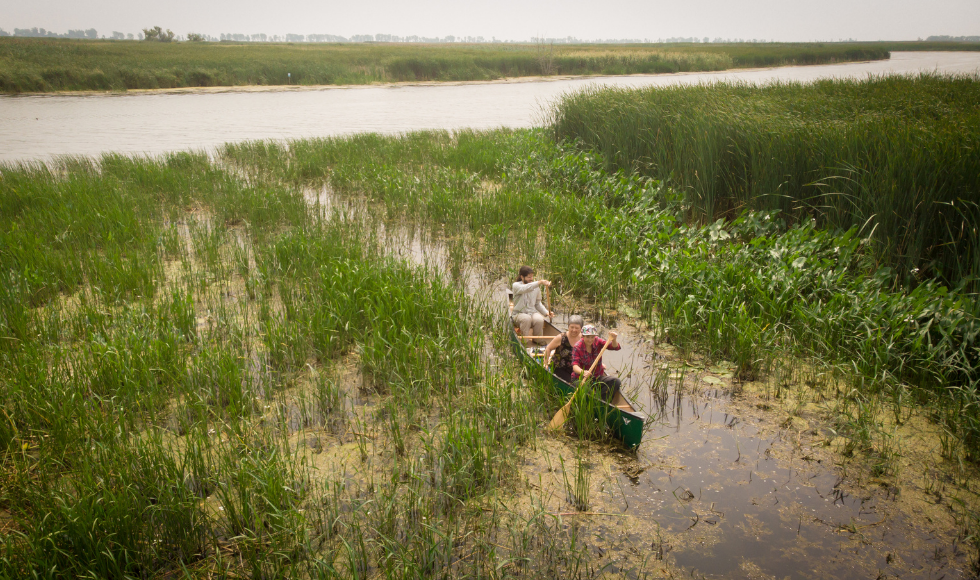McMaster researchers awarded $1.25 million in New Frontiers in Research Fund grants

Wetland habitat expert Pat Chow Fraser, seen here, is one of five McMaster researchers to have received New Frontiers in Research Fund grants for ambitious and innovative research projects.
April 4, 2022
Five McMaster researchers have been awarded a combined $1.25 million from the Government of Canada to advance their research across a number of disciplines.
The investment comes from the New Frontiers in Research Fund. Three researchers have been awarded Exploration grants, and two are receiving funding for innovative approaches to research in the pandemic context, part of a special call to support emerging research.
“I salute our researchers whose success in this competition is a direct reflection of their innovation and the promise their work holds to improve the lives of Canadians,” says Karen Mossman, vice-president, research.
“These awards are instrumental to ensuring Canada’s global competitiveness and I commend the government for these timely and strategic investments.”
These are the recipients of the 2021 New Frontiers in Research Fund awards
Special call on innovative approaches to research in the pandemic context
This year’s NFRF special call was for innovative approaches to research in the pandemic context. These grants aim to accelerate the exploration of new approaches, and the development and testing of new directions in research — such as community and field-based research, which have been disrupted by the pandemic.
These awards support projects that will now be able to continue work that was interrupted or stalled by the pandemic, as they try or test novel and innovative research approaches with the potential to benefit Canada and the world.
These projects are time-sensitive and demonstrate a new way of doing research in situations where COVID-19 restrictions make it impossible to use conventional or established research methods.
Pat Chow-Fraser, Faculty of Science
Project: Ethno-ecosystem approach to conserving imperiled freshwater turtles in two Indigenous Georgian Bay coastal communities
With researchers unable to access most of the endangered Blanding’s turtle’s habitats in the Georgian Bay region because of pandemic restrictions, Chow-Fraser proposes a new ecosystem approach to mapping these habitats. The project would involve academics and all other stakeholders and land owners — such as First Nations and cottagers — at all stages of the study, including field tracking and data collection by First Nations youth interns and cottage volunteers.
They will use novel GPS-enabled tracking devices and as-yet field tested methods to confirm turtle occupancy using environmental DNA samples. Broader community involvement is also likely to lead to better implementation of any proposed measures that result from the study. The innovative partnership arrangement could ensure long-term protection of turtles in remote areas even if access becomes interrupted again in future pandemics.
Katherine Bujold, Faculty of Science
Project: Development of remote collaboration strategies across institutions through the synthesis of biomolecule conjugates
Bujold proposes implementing novel remote collaboration methodologies for early career researchers and students who have been unable to engage in collaborative research because of pandemic restrictions. These innovations include remote training in laboratory procedures using parallel workstations and the safe shipment of samples that are sensitive to cold temperature experienced in Canadian winters.
Bujold’s pilot collaboration with Janelle Sauvageau’s group at the National Research Council of Canada will develop nanoscale glycan-nucleic acid conjugates for therapeutic applications, combining her group’s work on nanoscale nucleic acid nanostructures and the Sauvageau group’s work on glycan synthesis and characterization.
The goal is to use these new methodologies to open the door for fully remote collaboration between researchers across Canada, regardless of physical distance.
NFRF Exploration awards
The NFRF Exploration grants support initiatives that push boundaries in exciting new areas and inspire high-risk, high-reward and interdisciplinary research. Each researcher will receive up to $250,000 over the next two years.
Rong Zheng, Faculty of Engineering
Project: Towards virtual and augmented acoustic reality on commodity devices
Zheng’s project will use mobile devices and machine learning, to develop a virtual and augmented acoustic reality (VAAR) framework that delivers customizable experiences on individual’s devices to mitigate hearing loss and help expand auditory range.
Eric Brown, Faculty of Health Sciences
Project: New antibiotics using molecular trickery
Brown’s project redefines antibiotic drug discovery, creating new antibiotic molecules for treating drug-resistant infections. His group has developed a method to identify chemicals that enhance bacterial growth, enabling antibiotic action in other molecules. By grafting these molecules on to ineffective antibiotics, he plans to vastly improve the penetration of antibiotic drugs into bacteria.
Ivona Kucerova, Faculty of Humanities
Project: Language revitalization in infants: Lullabies as a tool to promote intergenerational mobility, Indigenous health and community well-being
Kucerova’s project focuses on revitalization of Indigenous lullabies and traditional ways of infant-oriented speech as means of recreating language-focused intergenerational relationships. The project will connect elder women with younger women who often do not speak their Indigenous language. Engaging with Indigenous lullabies is likely to promote the sense of Indigenous identity and create additional support structures for the mothers, contributing to both maternal and infant well-being, as well as positive emotional health and community benefits for older adults.
The project indirectly addresses intergenerational trauma associated with language loss, often through the impact of residential schools, and proposes a restoration of intergenerational language knowledge transmission as a healing process.


